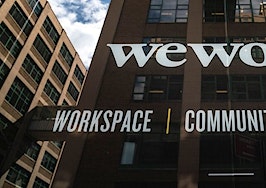SoftBank, the Japanese conglomerate with a heavy investment in U.S. tech startups, posted a net loss of slightly more than 700 billion Japanese yen – or approximately $6.4 billion – in the second quarter of the fiscal year ending March 31, 2020.
The company also reported after WeWork’s failed initial public offering and public valuation plummet that it lost approximately $4.6 billion in its WeWork stock value from that valuation decline.
“The impact of the Vision Fund due to WeWork and also to SoftBank group was quite a large impact that we’ve been seeing,” SoftBank CEO Masayoshi Son said, in an investor presentation, through an interpreter. “That’s my judgment. The investment was not right in many ways. I regret [it] in many ways.”
WeWork, the embattled co-working space provider, came under 80 percent ownership by Softbank last month while the firm’s former CEO, Adam Neumann, will receive up $1.7 billion to relinquish his voting rights.
The bailout for WeWork, which CNBC reports had been set to run out of money, amounted to nearly $10 billion.
Under the deal, Softbank — also a major backer of real estate tech giants Compass and Opendoor — will inject $5 billion in new financing into WeWork. Softbank is also offering a $3 billion buyout to all of WeWork’s other investors, and will accelerate a previous $1.5 billion funding commitment.
SoftBank’s net loss was historically large, according to Son, who did note that SoftBank increased its shareholder value and increased the SoftBank Vision fund’s revenue by 50 percent in the second quarter. But the Vision Fund itself, likely pulled down by the WeWork struggles, posted a segment net loss of $5.25 billion in the six months ending on September 30, 2019, which is down from the $5.8 billion profit it posted over the same period in 2018.
Of the companies, 37 contributed to valuation gain and 22 contributed to the loss of value. One of those that contributed to the loss was Wag, a dog-walking startup.
“We paid a lot of value in a company that specializes in dog walking, and SoftBank must be going mad,” Son said through a translator. “We learned a harsh lesson from that investment.”
With Uber and Slack, which have struggled in the public equity markets, SoftBank’s shares are still worth more than the price at which the company purchased them. Nonetheless, it remains to be seen what the longterm impact of SoftBank’s struggles will mean for Compass and Opendoor, which are both still private companies with a significant investment from SoftBank.
Compass has publicly distanced itself from WeWork’s failed IPO and has said there aren’t any immediate plans to go public over the next 18 months.







